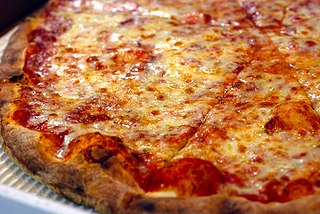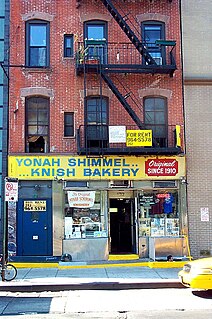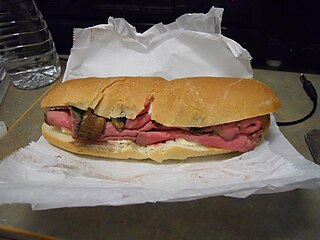
Milton Parker (January 10, 1919 – January 30, 2009) was a co-owner of the Carnegie Deli, located at 55th Street and Seventh Avenue next to Carnegie Hall in the New York City borough of Manhattan, serving as the behind-the-scenes preparer of towering pastrami sandwiches while his partner Leo Steiner was the tummler who entertained celebrities, locals and tourists.

The Carnegie Deli was an iconic small delicatessen chain based in New York City. Its main branch, opened in 1937 adjacent to Carnegie Hall, was located at 854 7th Avenue in Midtown Manhattan. It closed on December 30, 2016. There are two branches still in operation at The Mirage on the Las Vegas Strip and at Madison Square Garden in Manhattan. The deli, though having had its main branch closed, still operates a wholesale distribution service.
55th Street is a two-mile-long, one-way street traveling east to west across Midtown Manhattan.

Seventh Avenue – known as Adam Clayton Powell Jr. Boulevard north of Central Park – is a thoroughfare on the West Side of the borough of Manhattan in New York City. It is southbound below Central Park and a two-way street north of the park.
Parker was born on January 10, 1919, in Williamsburg, Brooklyn, to Jacob and Jennie Picker Packowitz, both of whom died while Parker was a child. He worked in Brooklyn diners and luncheonettes as a teen, and opened a coffee shop in a mall near Levittown, New York. He sold the establishment in the 1970s, but was bored after spending a year in retirement. Hearing from a business broker who knew that the Carnegie Deli was up for sale, he was part of a group that bought the business. [1]

Williamsburg is a neighborhood in the New York City borough of Brooklyn, bordered by Greenpoint to the north; Bedford–Stuyvesant to the south; Bushwick and East Williamsburg to the east; and the East River to the west. As of the 2010 United States Census, the neighborhood's population is 32,926.

Brooklyn is the most populous borough of New York City, with an estimated 2,648,771 residents in 2017. Named after the Dutch village of Breukelen, it borders the borough of Queens at the western end of Long Island. Brooklyn has several bridge and tunnel connections to the borough of Manhattan across the East River, and the Verrazzano-Narrows Bridge connects it with Staten Island. Since 1896, Brooklyn has been coterminous with Kings County, the most populous county in the U.S. state of New York and the second-most densely populated county in the United States, after New York County.
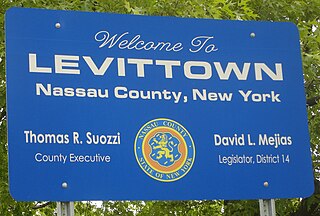
Levittown, formerly Island Trees, is a hamlet and census-designated place (CDP) in the Town of Hempstead in Nassau County, New York on Long Island. It is located half way between the villages of Hempstead and Farmingdale. As of the 2010 census, the CDP had a total population of 51,881, making it the most populated CDP in Nassau County and the second most populated CDP on Long Island, behind only Brentwood.
The Carnegie Deli was taken over by Parker in 1976, together with Leo Steiner and a third, less-active partner who sold his stake in the restaurant. Steiner died in 1987, and Parker retired in 2002, with management taken over by Sanford Levine, his son-in-law. Parker's business cards described him as "Milton Parker, CPM (Certified Pastrami Maven)". [1]
Leo Steiner was a Jewish American restaurateur who was co-owner of the Carnegie Deli, located next to Carnegie Hall at 55th Street and Seventh Avenue in the New York City borough of Manhattan. While his partner, Milton Parker, mostly worked behind the scenes, Steiner worked the crowd with his Jewish humor in the restaurant, which became a destination for both celebrities and tourists in the theater district.
Parker worked in the kitchen, behind the scenes, responsible for the traditional Eastern European Jewish cuisine of smoked meats — corned beef, pastrami, brisket and tongue — loaded into 5-inch-high (130 mm) sandwiches, along with chicken soup and matzah balls, pickles and cheesecake. Partner Leo Steiner was the master of ceremonies in the dining room, greeting the many celebrities, such as Woody Allen, Jackie Mason, Yves Montand and Henny Youngman and taking them to their tables of choice and entertaining the many theater district tourists who came to partake in the festivities. [1]

Jewish cuisine is a diverse collection of cooking traditions of the Jewish people worldwide. It has evolved over many centuries, shaped by Jewish dietary laws (kashrut), Jewish Festival and Shabbat (Sabbath) traditions. Jewish cuisine is influenced by the economics, agriculture and culinary traditions of the many countries where Jewish communities have settled and varies widely throughout the whole world.
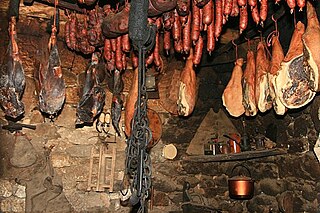
Smoked meat is a method of preparing red meat which originates in prehistory. Its purpose is to preserve these protein-rich foods, which would otherwise spoil quickly, for long periods. There are two mechanisms for this preservation: dehydration and the antibacterial properties of phenols and other chemicals in the absorbed smoke. In modern days, the enhanced flavor of smoked foods makes them a delicacy in many cultures.

Corned beef is a salt-cured beef product. The term comes from the treatment of the meat with large-grained rock salt, also called "corns" of salt. Sometimes, sugar and spices are also added to corned beef recipes. Corned beef is featured as an ingredient in many cuisines.
Of the many delicatessens in the area, the Carnegie Deli has had a longstanding rivalry with the nearby Stage Deli. While the Stage Delicatessen long had the better reputation, a 1979 article in The New York Times that rated the Carnegie Deli's pastrami as superior helped spur business and set off what had been described as the "Pastrami War". While both businesses routinely had customers lined up outside the door, Parker dismissed the Stage Deli, saying that "They're living off our overflow". Among the allegations in the war was that the Carnegie Deli's pastrami was made at its commissary in Secaucus, New Jersey, with water from the Garden State, unlike the New York City water used to prepare the brine made by the Stage Deli for its pastrami. [2]

A delicatessen or deli is a retail establishment that sells a selection of fine, unusual or foreign prepared foods ("delicacies"). Delicatessen originated in Germany during the 18th century and spread to the United States in the mid-19th century. European immigrants to the United States, especially Ashkenazi Jews, popularized the delicatessen in American culture beginning in the late 19th century.

The Stage Deli, located on Seventh Avenue just two blocks from Carnegie Hall, was a well-known New York City delicatessen, patronized by numerous celebrities. It was first opened in 1937 by Russian immigrant Max Asnas. The deli was known for Broadway-themed dishes including the "Mamma Mia!" sandwich. It had other menu items named for the celebrities who have dined there, including Sarah Ferguson, Adam Sandler, Dolly Parton, Martin Short, and Ron Blomberg.

The New York Times is an American newspaper based in New York City with worldwide influence and readership. Founded in 1851, the paper has won 127 Pulitzer Prizes, more than any other newspaper. The Times is ranked 17th in the world by circulation and 2nd in the U.S.
Scenes from Woody Allen's 1984 film Broadway Danny Rose , which told the story of a hapless talent agent, played by Allen, had much of the movie featuring scenes filmed over a meal at the Carnegie Deli. [1]
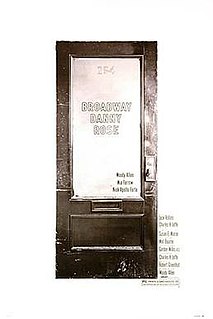
Broadway Danny Rose is a 1984 American black-and-white comedy film written and directed by Woody Allen. It follows a hapless theatrical agent who, by helping a client, gets dragged into a love triangle involving the mob. The film stars Allen as the titular character, as well as Mia Farrow and Nick Apollo Forte.
Though the restaurant had opened in 1938, it never had knishes on the menu until 1988, when they were introduced by Parker, accompanied by a knish-eating competition created as a publicity stunt. The $250 prize went to a soda salesman from Brooklyn who had never eaten a knish before, but managed to consume four and one-half of the one-pound knishes in the allotted 15 minutes. [1]
A Los Angeles branch of the Carnegie Deli, co-owned by billionaire Marvin Davis, opened with much fanfare in July 1989, with opening ceremonies including Carol Channing dropping a giant Styrofoam matzoh ball into a correspondingly huge bowl of chicken soup, with the ceremonial slicing of a 6-foot-long (1.8 m) salami substituting for the more traditional ribbon cutting. In the face of declining business and poor reviews, including what was called by Zagat Survey's local restaurant guide as the city's "worst chicken soup", the restaurant closed down in November 1994. [3]
Catskills Mountains comedian Freddie Roman lamented his death, reminiscing that "In the history of delicatessens, Milton Parker's Carnegie Deli caused more heartburn to the Jewish world than anything I've ever heard of" and that "His pastrami sandwich was incredibly much too large for human consumption." [1]
A resident of Manhattan, Parker died at age 90 on January 30, 2009, due to respiratory problems. He was survived by his wife of 62 years, the former Mildred Levy, a son, a daughter, a brother and a granddaughter. [1]
